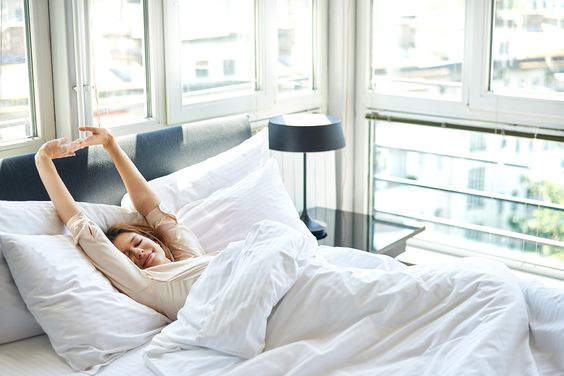
What You Should Know About Good Sleep Hygiene
What you should know about good sleep hygiene
Sleep is a hot topic at the moment. The chances are you’re either not getting enough of it, or without knowing you’re doing everything you’re not meant to do in the lead up to bedtime. Damn Netflix for keeping us up all night.
When you think about hygiene you probably think about cleanliness, or health, not sleep. Everyone has a shower routine, or a teeth routine, but do you have good sleep hygiene and what does this even mean?
There are 4 main groups that good sleep hygiene can fall into. Your daytime habits, the hours leading up to bedtime, your sleep environment, and lastly, trying to sleep can all determine the quality of your sleep.
Daytime Habits
Good sleep hygiene begins the moment you wake up. If you want a good quality sleep, developing a positive daily routine will pave the way for this. An easy habit to kick early in the day is one we all know and love, caffeine. Giving yourself an afternoon cut off point, or cutting caffeine out altogether, (eek!) will have a positive effect on your sleep.
Exercising during the day gets rid of excess energy, which can cause restlessness at night. Not only this, but exercising releases endorphins and endorphins make you happy (quote Legally Blonde). But on a science note, the biochemicals that exercise produces reduces stress and anxiety, which are some of the common things that keep us tossing and turning at night.
If you’re a daytime napper, keep them short and no longer than 20 minutes because anything over a power nap can disrupt your circadian rhythm.
I bet you didn’t realise that diet can also affect your sleep. Good nutrition is an essential part of sleep hygiene. Eating high protein foods like pumpkin seeds, lentils, oats, chicken and cheese, which are all high in amino acid, promote melatonin.
Hours Leading Up to Bedtime
You might not think about this as a crucial part of good sleep hygiene, but what you do in the few hours leading up to bedtime can determine how well you sleep. Establishing a healthy bedtime ritual should become a regular habit, so for example, a warm bath, light reading, yoga and Pilates all promote relaxation.
Avoid big meals, caffeine and alcohol at least 3 hours before bedtime. A glass of wine can help us nod off, but once it’s metabolised the withdrawal symptoms cause arousal. Now you know why you’re so tired on a hangover! And a good tip is not to have a glass of water next to your bed; it can train your mind to wake up and drink it.
Sleep Environment
If we’re thinking Feng Shui, research shows that improving your sleep environment can increase your chances of a good nights sleep. This is a great excuse to go out and buy some high count Egyptian cotton bedding and perfect mattresses from naturalmat.co.uk because good quality bedding is essential for a good night’s sleep. Most modern day bedrooms are unsuitable for a good nights sleep. An obvious reason being electronics, all of this should be kept away and the bedroom should only be associated with sleep and sex. Apparently losing the PJ’s and sleeping naked can help regulate your body temperature and improve your quality of sleep. For the best quality sleep, bedrooms should be dark quiet and cool.
Trying to Sleep
You’re in bed and whatever you do, you can’t switch off. Everyone would have experienced this at some point, or on a regular basis. There are ways to cope with this, including not watching the clock. Worrying about the time causes more anxiety, making it harder to drift off. As well as this, forcing yourself to sleep has the reverse effect. Thinking about pleasant scenes will help distract you so that you can forget about falling asleep and slowly nod off. The more you think about the next day’s events and how late it is, the more you worry. It’s best to resign yourself to the idea that it’s already late and there’s nothing you can do about it, this will help you relax.
















































